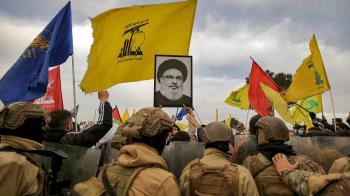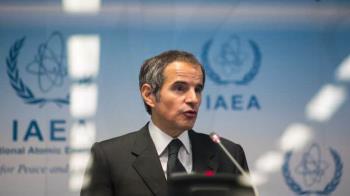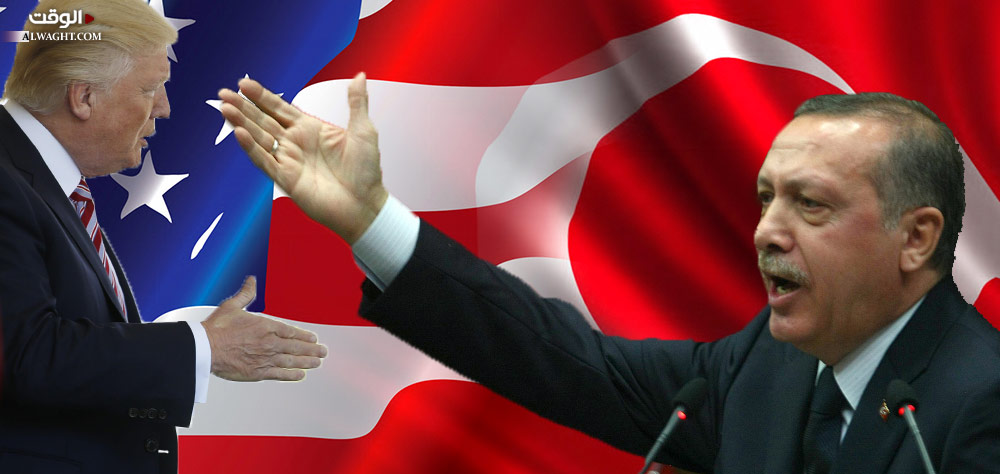Alwaght- Less than three weeks ago, US President Donald Trump during his meeting with Turkish President Erdogan on the sidelines of the United Nations General Assembly praised the close relations of Washington and Ankara, saying “I think now we’re as close as we’ve ever been.” Despite Trump's commendation, the Washington-Ankara relations have been plagued by diplomatic chill for over a year. Now their ties are struck by tensions and two sides have suspended issuing visas to citizens of the opposite side.
A couple of days ago, the American embassy in Turkey has issued a statement, saying that it only will issue migration visas for the Turkish nationals. As for explanation for its visa services limitation, the embassy stated that it aims to minimize the number of visitors to guarantee security of its diplomatic missions in Turkey.
On the other side, Turkey’s embassy in Washington, too, issued a statement, maintaining: “Recent events have forced the Turkish Government to reassess the commitment of the Government of the U.S. to the security of the Turkish Mission facilities and personnel.” The Turkish statement was in fact a copy of the earlier American statement published on its website.
The US-Turkey tensions boiled over last week when a diplomatic employee of the US consulate was detained in Turkey. Istanbul police last week arrested an employee of the American consulate in Istanbul, accusing him of spying and also attempting to overthrow the Turkish government. Reacting to the arrest, the US consulate rejected the charges against its employee and called them “baseless.” The Turkish state TV named the arrestee as Metin Topuz, adding that he is a Turkish national.
The US and Turkey ties have been entangled in escalated tensions since the failed Turkish coup of July 2016. Since then, the Turkish leaders repeatedly asked Washington to hand over to Turkey Fethullah Gulen, a US-based Turkish preacher and opponent of Erdogan who has been blamed by the Turkish president as masterminding the last July unsuccessful putsch aimed at bringing down President Recep Tayyip Erdogan.
Gulen, who has been in self-exile for nearly 18 years and residing in Pennsylvania, has denied any links to the power grab attempt. However, his denial did not dissuade Ankara from seeing a “conspicuous” role for him is plotting inside the country against President Erdogan.
Gulen case is only one of many issues sending the Washington-Ankara relations frayed. They are divided on a series of regional cases, and their gaps are widening day by day. Syria, for example, is one area of the two allies' dispute. Despite the fact that Ankara provides military and logistical support for some of the militant groups, such as the Free Syrian Army, who are fighting against the central Syrian government, it raised concern about the American backing for Syria’s Kurdish militias who are gathered under an alliance dubbed Syrian Democratic Forces along with some Arab factions.
The US mainly backs the People’s Protection Units (YPG), an all-Kurdish militant organization active in Syria. Operating as the military wing of the Democratic Union Party (PYD), YPG holds close relationship with the Kurdistan Workers' Party (PKK), an archenemy of Turkey and involved in many conflicts with the Turkish army for nearly four decades. The US so far declined to blacklist YPG as a terrorist group, though it in 2004 announced the PKK a terrorist organization.
The advances of the YPG in past few months have raised the hackles of the Ankara leaders. Turkey has demanded that the advancing US-backed Kurdish forces retreat to the east of the Euphrates River, after they struggled to pass the river in order to take more areas in a bid to connect the three Kurdish cantons of Island, Kobani, and Afrin. The main source of the Turkish concerns about the Kurdish progression in northern Syria is the fear of achievement of territorial unity and autonomy that facilitates links between the YPG and the Kurdish rebels in Turkey, on top of them the PKK. This has been source of discord between Washington and Ankara that warned the American support for the Kurds runs counter to the Turkish national security.
Meanwhile, it is not only with the US that Turkey has developed entangled relations. Over past year, the German-Turkey relations have departed from previous warmth, especially after Turkey detained a German journalist. Seeking to block Ankara’s accession to the European Union, the German officials recently called on the bloc to toughen the conditions for Ankara admission to the 28-member union. The three NATO members confrontation coincides with the Turkish moving towards establishing cozy relations with Russia and Iran.
Russia has recently announced plan to deliver the modern S-400 missile defense system to Turkey, sending Erdogan into contentment of making new ally. Ankara also agreed with Tehran and Moscow to expand the “de-escalation zones” across Syria to help the devastating conflict wind down. The three countries announced that they started arrangements to see enforcement of the Syrian deal. Additionally, the Turkish president last week visited Tehran and discussed an array of issues with the Iranian officials, with the Iraqi Kurdistan independence referendum being high on the agenda of the negotiators who decided that the discussion was constructive.
The analysts believe that more tense relations of Washington and Turkey can strengthen alliance of this regional actor with Iran and Russia, something glaringly noticeable in Syria these days, with potential to expand to cover other regional cases. Washington is, meanwhile, discomforted to see the developments going in separation from its desire.



























